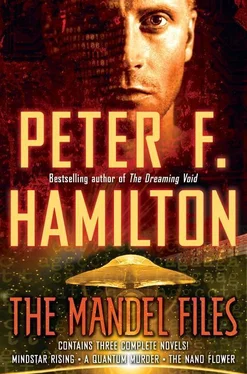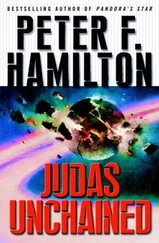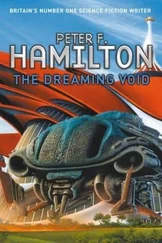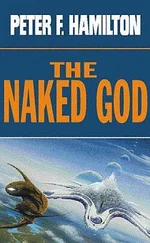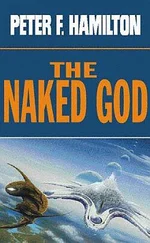Will this be a long operation?” he was asking. “Some of the observation positions are improvised, temporary.”
“It shouldn’t take more than an hour, two at the outside.”
“Fine. Did you fall down some stairs?”
Greg’s hand went to the stiff white mould over his nose. “Not exactly. A run-in with a friend of Mr Ellis.”
“I see. Do you want a weapon before we go in?”
“Are you carrying?”
“Yes. A Lucas laser pistol.”
“That ought to be enough. You keep it.” Greg began to walk towards the Castlewood’s nearest barrier.
“Fine.” Victor showed a card to the gate beside the barrier. “Concierge’s pass,” he explained.
Greg lifted an appreciative eyebrow. And only a twenty-minute head start. Morgan Walshaw ought to start worrying for his job. “Will it open the apartment doors as well?”
Victor did his best not to appear smug. “Of course.”
The Castlewood was built in a U-shape. The two wings had a conservatory-style glass roof slung between them, curving down to form a transparent wall at the open end. The glass was tinted amber, cooling the sunlight which shone down on a bowling green, tennis courts, an Olympic-sized swimming pool, and a separate diving pool. Four tiers of balconies made a giant amphitheatre of the enclosure. Their long strips of silvered sliding doors staring down on the athletically inclined with blank impersonality.
Charles Ellis owned a penthouse apartment on the fourth storey, at the tip of the east wing. One of the most expensive in the condominium. Victor stood outside the door, glancing at Greg for permission.
He held his hand up for the young security captain to wait, and probed with his espersense. There was only one mind inside, a muddled knot of everyday worries and conflicts. Not expecting trouble.
“He’s alone,” Greg said. “To the right as we go in.” He pointed through the wall.
“Fine,” Victor acknowledged respectfully. He showed the concierge card to the lock. There was a soft click.
The apartment was five large rooms laid out in parallel, with a hall running along the back of them. Surprisingly, the decor was old-fashioned throughout. Uninspiring, sober prints and dingy Victorian furnishings, all black wood and thick legs draped in cream-coloured lace. The internal doors were heavy varnished hardwood, with brass hinges and handles, opening into rooms with dark dressers and tables. Chairs were gilt-edged, upholstered in plain shiny powder-blue fabric, marble-top tables with bronze legs.
The lounge where they found Charles Ellis had six glass-fronted teak wall cabinets exhibiting hundreds of beautifully detailed porcelain figurines. There was a profusion of styles, with animals predominating; whoever owned them was obviously a dedicated collector. Rich, too, though Greg was no real judge, but money had its own special tell-tale radiance. And it haunted those shelves. He could feel the love and craftsmanship which had been expended in the fashioning of each exquisite piece.
Ellis was a small man in his early fifties, barely over one and a quarter metres tall. His body and limbs didn’t quite seem to match, his torso was barrel-shaped, going to fat, but his legs and arms were long and thin, spindly. He had a narrow head, with tight-stretched skin, thin bloodless lips, and a prominent brow overhanging nicotine-yellow eyes. Lank oily hair brushed his collar, leaving a sprinkling of dandruff. He hadn’t shaved for a few days, his stubble patchy and grey.
His imbalanced frame was wrapped in a paisley smoking jacket with a quilted green collar. He was sitting in a high-backed Buckingham chair watching a news channel on a big Philips flatscreen, thick velvet drapes hung on either side of it, like theatre curtains. The flatscreen was showing a rooftop view of some desert city, indefinably African; its streets were awash with refugee trains, twisters of black smoke rising from shattered temple domes. A chrome-silver fighter flashed overhead, discharging a barrage of area-denial submunitions; tiny parachutes mushroomed in mid-air, lowering the shoal of AP shrapnel mines gently on to the beleaguered city.
Charles Ellis turned his head towards Greg and Victor, disturbed by the draught as they opened the lounge door. His facial muscles twitched, pulling the skin even tighter over his jaw-bone.
The flatscreen darkened as he rose from the chair, curtains swishing across it; he had to push hard with his bandy arms to lift himself. “How did you get in?” he asked.
“Door was open,” Greg said.
“You’re lying. What do you want?”
“Data.”
His expression was thunderstruck. “How did you know? Nobody knows I deal in data.”
Greg gave him a lopsided apologetic smile. “Somebody does. Cover him.”
Ellis swayed backwards as Victor produced his Lucas pistol. “No violence, no violence.” It was almost a mantra.
Greg walked across the room and looked down on the Castlewood’s dark blue diving pool. The lounge was on the corner of the building, two sides of it were glass. The balcony ran all the way round, one-third of it under the condominium’s weather-resistant covering.
“Whoever you are, you’re an idiot,” Ellis said, “You have absolutely no conception of what you’ve gone and walked into. The kind of people I associate with can tread you back into the mire that gave you birth.”
Greg smiled right back at him, baring his teeth. “I know. That’s why we came, for your top-rank friends.”
Whatever Ellis was going to say died on his tongue.
“Wolf,” Greg said. Naked alarm rocked Charles Ellis’s already fraught mind. “Medeor.” It produced the same response. “Tentimes.”
“Never heard of them.”
“Wrong. I’m psychic, you see.”
Ellis’s face hardened, forestalling the onrush of fear and suspicion kindling behind his eyes.
“In fact, you are Wolf, aren’t you?”
True, the mind before him blurted helplessly.
“Thank you,” said Greg.
Ellis looked at him with revulsion and hatred.
“Do you know what these are?” Greg asked Victor casually. He rested a hand on one of the three grey football-sized globes that were sitting on a leather-topped Edwardian writing desk. A Hitachi terminal was plugged into each of them with flat rainbow ribbons of optical cable. “They’re Cray hologram memories. You can store half of the British library in one of these.”
Greg tapped the Hitachi’s power stud. LCDs flipped to black across its pale-brown surface, forming a standard alphanumeric keyboard. The cube lit with the Crays’ data storage management menu. “You’ll note that they’re kept in isolation, not plugged into the English Telecom grid. So nobody can hack in. After all, bytes are money, especially when you know how to market them as well as Medeor here.”
“What are you going to do?” Ellis’s voice was a grizzled rasp coming from the back of his throat.
“Whatever I have to.” Greg read the menu codes and accessed the first Cray. “Sixty-two per cent capacity used up,” he observed. “That’s one fuck of a lot of data. Now I could go through a whole list of names I’m interested in and see which your mind flinches at, but that would be very time consuming. So I’m just going to ask you to tell me instead. Who paid you to organize the blitz on the Event Horizon datanet?”
Ellis shook his skeletal head, jaw clenched shut. “No.”
Greg showed his card to the Hitachi’s photon key, using his little finger to activate it. The percentage figure began to unwind at an impressive speed as Royan’s data-crash cancer exploded inside the Cray. He hadn’t been totally sure it would work on lightware. Admitting now he should’ve had more faith. The percentage numerals vanished from the cube, sucked away down some electronic black hole. The cube placidly reverted to showing the menu.
Читать дальше
